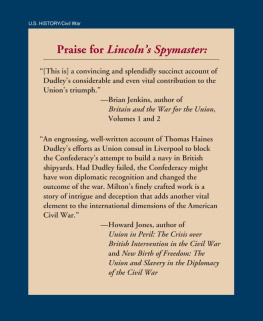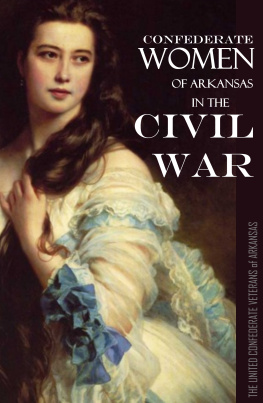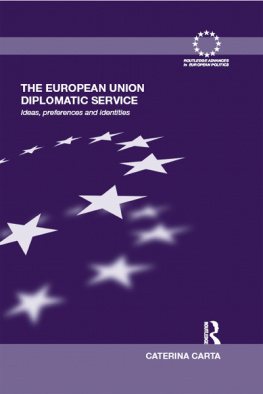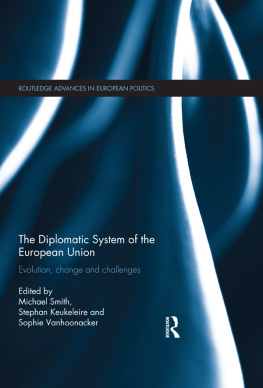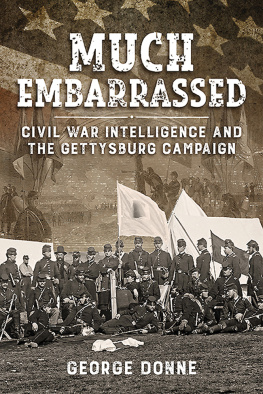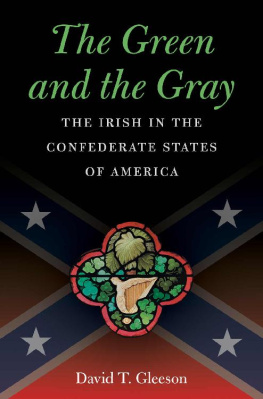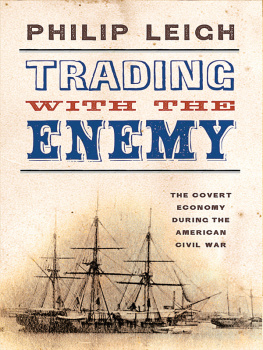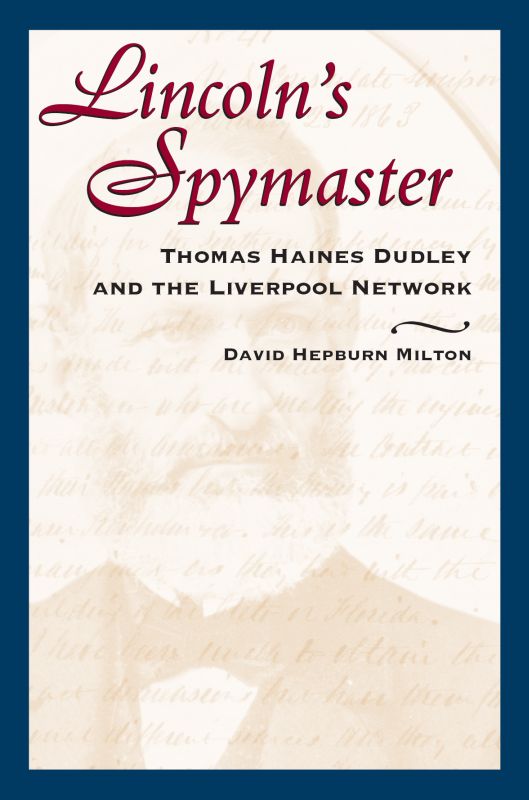
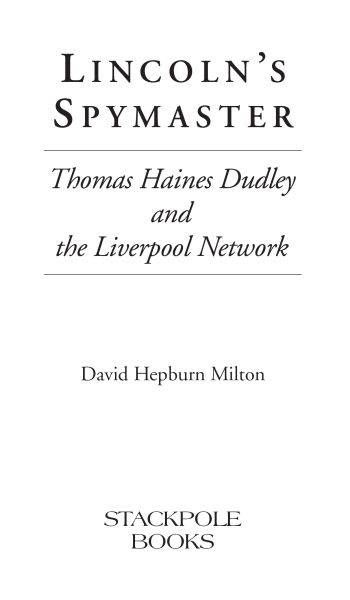
COPYRIGHT: Copyright 2003 by Stackpole Books
Published by
STACKPOLE BOOKS
5067 Ritter Road
Mechanicsburg, PA 17055
www.stackpolebooks.com
All rights reserved, including the right to reproduce this book or portions thereof in any form or by any means, electronic or mechanical, including photocopying, recording, or by any information storage and retrieval system, without permission in writing from the publisher. All inquiries should be addressed to Stackpole Books, 5067 Ritter Road, Mechanicsburg, Pennsylvania 17055.
Printed in the United States of America
10 9 8 7 6 5 4 3 2 1
FIRST EDITION
Library of Congress Cataloging-in-Publication Data
Milton, David Hepburn.
Lincolns spymaster : Thomas Haines Dudley and the Liverpool network / David Hepburn Milton. 1st ed.
p. cm.
Includes .
ISBN 0-8117-0015-1
1. Dudley, Thomas H. (Thomas Haines), 18191893. 2. United StatesHistoryCivil War, 18611865Secret service. 3. SpiesUnited StatesBiography. 4. SpiesEnglandLiverpoolBiography. 5. Espionage, AmericanEnglandLiverpoolHistory19th century. 6. United StatesHistoryCivil War, 18611865Naval operations. 7. Confederate States of America. NavyHistory. 8. United StatesForeign relationsGreat Britain. 9. Great BritainForeign relationsUnited States. I. Title.
E608 .M45 2002
973.757dc21
2002008138
eBook ISBN: 9780811751612
For Nancy and our forty-year adventure together
Contents
List of Illustrations
.
Acknowledgments
My interest in the career of Thomas Haines Dudley was stimulated by reading James M. McPhersons excellent one-volume history of the American Civil War, Battle Cry of Freedom: The Civil War Era. I was particularly intrigued by McPhersons description of the U.S. consul at Liverpool as a combative Quaker who was engaged in a secret duel with the able head of the Confederate Secret Service, James Dunwoody Bulloch. McPherson described this struggle as a contest of lawyers, spies and double agents that would furnish material for an espionage thriller.
After some preliminary research, I discovered that there were no biographies of Thomas Dudley and that his story had to be pieced together from monographs and histories of the period. My primary research was done at the Huntington Library in San Marino, California, which holds a wonderful collection of the papers of Thomas Haines Dudley, including all of his Liverpool dispatches. Basing my research on this primary material, I was then able to flesh out the story with the aid of major historians of the diplomatic and international aspects of the Civil War period. I describe these sources in some detail in a bibliographical note at the back of this volume.
I owe a great deal to Tom Engelhardt, my former editor and old, dear friend, who was the first professional to read the whole manuscript and enthusiastically encouraged me to seek its publication. Engelhardt made a number of useful suggestions that I have incorporated in the book. Another friend, John Plotz, a lawyer with literary talent, also made helpful recommendations that I have adopted.
I especially wish to thank William Cameron Davis, a Civil War scholar associated with the Center for Civil War Studies at Virginia Tech, who read the manuscript and recommended it for publication by Stackpole Books. Leigh Ann Berry, editor at Stackpole Books, patiently and expertly expedited the complex process of publication from start to finish. It was a pleasure to work with her, and I also thank editorial assistant Ryan Masteller and copyeditor Joyce Bond, for their professional help in improving the manuscript
I am indebted to John Rhodehamel, Norris Foundation Curator of American History at the Huntington Library, who photocopied all the illustrations scattered among the Dudley papers and forwarded them to me. A number of these illustrations of Confederate ships are included in this book, and I thank the Huntington Library for permission for their reproduction. I wish to thank Eric Daird, Trainer for Computing Services at Southern Oregon University, for his patient and expert advice that allowed me to conquer some complex computer problems with the manuscript.
Finally, I am fortunate to be married to a writer and English teacher whose professional expertise has been indispensable to my writing over many decades.
Introduction
Historians of the American Civil War disagree as to whether that war was essentially a domestic conflict or an international event. However, the dean of Civil War historians, Allan Nevins, had no doubts on this question, writing: No battle, not Gettysburg, not the Wilderness, was more important than the contest waged in the diplomatic arena and the forum of public opinion.
This book attempts to illuminate a crucial overseas theater of the diplomatic and intelligence war between the North and South during the American Civil War. The focus is on the dual strategic effort of the South to win Britain as an ally while at the same time constructing a state-of-the-art Confederate naval fleet in British shipyards, a strategy that was brilliantly countered by Thomas Haines Dudley, Lincolns consul at Liverpool. Without Dudley, the North might well have lost the struggle to prevent the construction of a Confederate navy in British shipyards. The Quaker lawyer from New Jersey may well be seen as the father of modern American intelligence operations on the international front that combine covert with conventional diplomatic strategies.
The birth of the United States emerged from a centuries-long international conflict among European imperial powers, primarily the English, French, Dutch, Spanish, and Portuguese. Thus, as this book argues, the American Civil War could be considered the last act in the epic struggle among European nations for dominance in North America. It was this second American Revolution, a war involving the most modern technology of its day, from which the United States arose as a major world power.
For more than two hundred years, European powers fought for control of the North American continent. In the seventeenth century, English expansion in New England clashed with French imperial designs in the North, Spanish claims in the South, and Dutch control of the Hudson River Valley. New France, New England, New Netherlands, and New Spain were all products of the mercantilist system that led to war among the great powers of the time. From the beginning, the evolution of the United States as a modern nation was a product of international forces.
In his seminal research on the origins of North American settlement, Bernard Bailyn argues that in the end the massive transfer to the Western Hemisphere of people from Africa, from the European mainland, and above all from the Anglo-Celtic offshore islands of Europe culminated in what Bismark called the decisive fact of the modern world.
Historians Richard Hofstadter, William Miller, and David Aaron agree that virtually from the beginning of settlement in North America, the Protestant British and the Catholic Spanish and French, each with their tentative Indian allies, had been warring with one another. The central issue in the enduring conflict was nothing less than the role and purpose of the New World in the European scheme of things.
North America was, therefore, only one front in a world war being fought among shifting European alliances. In the mid-seventeenth century, Britain, Portugal, and Prussia were aligned against France, Austria, Sweden, Russia, and Spain. This world conflict was fought out in Europe and the Mediterranean, the West Indies, the Indian Ocean and the far Pacific, as well as throughout North America. The American Revolution and the establishment of the United States of America can only be understood as a direct outcome of the continuing global war among the great nations of Europe.
Next page
